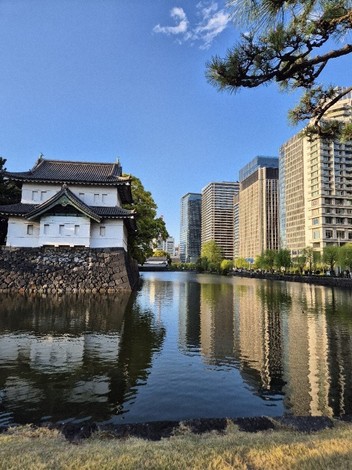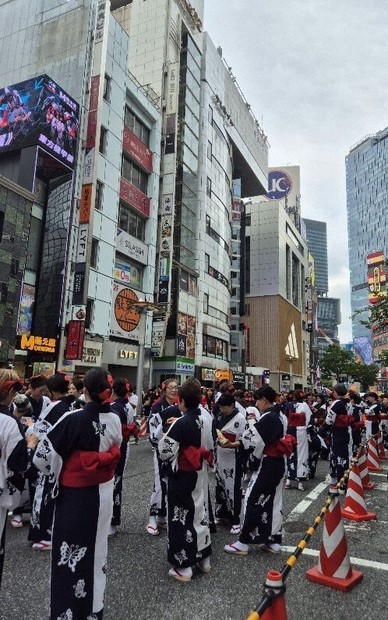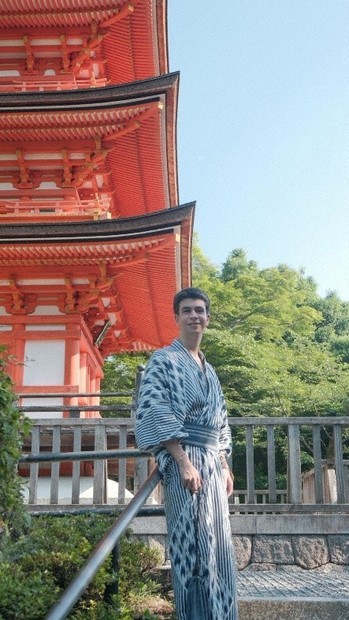
The author enjoys the views of the Mount Fuji for the first time.
Since a young age, living in Japan as a student had always been a dream of mine. That dream became a reality during the second year of my master’s in international relations, when I had the opportunity to study in Tokyo. Living in Japan has brought me unforgettable experiences that I now hold close to my heart.
As a student of international relations, I was particularly intrigued by Japan’s key role as a strategic partner of the European Union and as a significant actor in the Indo-Pacific region. However, what surprised me most was Japan’s remarkable ability to integrate the international community and developments into its society while firmly preserving its identity, values, and traditions.
A high degree of courtesy
Coming from a European country, Spain, I was struck by how thoroughly orders are followed in Japan, especially within formal settings, while still maintaining a clear sense of hierarchy and courtesy. In Europe, flexibility and improvisation are often seen as acceptable responses to unforeseen circumstances. In contrast, Japan tends to discourage exceptionality, particularly when a situation falls outside the structured framework of the workplace. Interestingly, as a result of the strong culture of respect, potential conflicts with a client are often mitigated through politeness and the use of keigo (honorific language). Keigo is deeply ingrained in the daily life of Japanese society, impressing me to the extent that I have embedded it within my own mother tongue, incorporating more respectful forms of language into my own communication style. To this day, that shift has made me a more thoughtful and grateful person.
Japan and the international community

This picture taken by the author showcases the harmonious contrast between the traditional and the modern at the water canal between Marunochi and the Imperial Palace in Tokyo.
As an international student, I was from the beginning willing to adapt to Japanese society despite the cultural differences with European countries. Although I expected several difficulties, what once were seen as unnecessary gestures soon became common sense for me. Indeed, my social circle of international students also adapted to the use of common phrases in Japanese keigo such as “otsukaresama desu” (thank you for your hard work) or “shitsurei itashimasu” (excuse me). Despite our cultural differences, we had the common interest of learning basic Japanese as we understood that these simple sentences would make our stay easier. Thus, the facility that Japanese society has to welcome signs of respect from international visitors and the polite reactions of people makes me feel that Japan has become a very welcoming nation.
Between tradition and modernity
What continues to captivate me most about Japan is its ability to embrace technological innovation while preserving both its traditional and modern identities. From participating in events like the Kagoshima Ohara Festival which takes traditional dancing to Tokyo’s Shibuya area, to discovering ancient shrines nestled between skyscrapers in the capital and Osaka, I’ve witnessed how Japan safeguards its cultural heritage even amid rapid urban development. Today, Japanese society presents an incredible blend of lifestyles — from the formality of kaishain (office workers) and school students, to the elegance of those wearing traditional yukata and kimonos, alongside a wide range of vibrant, alternative modern subcultures.
What remains constant is the widespread respect and politeness among citizens. Whether someone presents themselves as modern or traditional, casual or formal, Japanese etiquette is a common cultural thread that binds everyone together. I believe this shared approach to interpersonal respect is what allows Japan to maintain a balance between its historical legacy and its forward-looking spirit.

This picture taken by the author shows the Kagoshima Ohara Festival in Tokyo’s Shibuya ward.
This etiquette transcends social class, age, and profession. It acts as a shared cultural language, one that unites individuals from all walks of life, regardless of how rooted in tradition or immersed in modernity they may be.
Living in Japan has not only fulfilled a lifelong dream but also transformed the way I view culture, communication, and coexistence. Through my experiences, I have come to admire Japan’s unique ability to blend innovation with heritage, structure with empathy, and modern global presence with deeply rooted traditions. My time in Japan has shaped me both personally and professionally by deepening my appreciation for cultural respect and refining my interpersonal communication. Japan’s openness to those who approach its society with sincerity and respect is what ultimately made my stay both enriching and memorable. I carry these lessons with me, and I know they will continue to influence how I engage with the world for years to come.
(By Pol Navarrete)

Pol Navarrete
Profile: Pol Navarrete is originally from Barcelona, Spain. He has been studying international relations, EU-Asia relations, and Asia-Pacific studies in Japan since 2024. He recently finished his study abroad exchange program between his home university in Brussels and his host university in Tokyo. His interests are EU-Asia relations and more specifically, EU-Japan relations.
(This is Pt. 6 of a series. Subsequent parts will be published intermittently.)


AloJapan.com